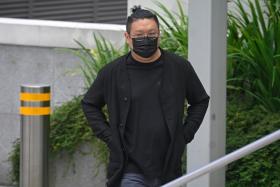ICA officers smash one of the biggest sham marriage syndicates in Singapore
ICA took six months to crack case, which involved one of the biggest syndicates here
A Singaporean "groom" would be flown to Vietnam for a wedding photo shoot with his Vietnamese "bride" as part of a ruse to make their "marriage" look genuine.
In some cases, the "groom" would be told to meet the "bride" at the Singapore airport in case immigration issues cropped up.
The "grooms" also changed their NRIC addresses to reflect that of the residences of the "brides".
Some couples lived together in the same unit for short periods of time to keep up the ruse.
This was to allow the "grooms" to familiarise themselves with the place and prove the marriage was genuine if questioned.
These were the tactics used by a syndicate to cover up an elaborate web of sham marriages involving six couples and two masterminds.
It took investigators from the Immigration and Checkpoints Authority (ICA) six months to crack the case, which turned out to be one of the biggest sham marriage syndicates here.
Syndicate members were among 53 people convicted last year of sham marriages - a 23.3 per cent rise from 43 in 2016.
The increase, however, comes after a downward trend that followed an amendment to the Immigration Act in 2012 to criminalise such marriages.
In 2013, there were 284 people caught for sham marriages.
Typically, sham marriages are discovered in isolation and involve a "straightforward" transaction between the "couple" and sometimes a broker.
This looked to be the case when a "groom" in the syndicate appealed against his "wife's" repatriation.
But investigations led officers to discover five more marriages of convenience, said Superintendent Maran Subrahmaniyan, 47, deputy director of ICA's enforcement division.
"We had to connect the dots to find out the exact narrative and that led us to discover that there was more than one couple," Supt Maran told The Straits Times.
A total of 14 people were part of the syndicate, though only 12 - six men and six women - were arrested as one "bride" had been repatriated for other offences and another left Singapore before ICA investigations began in July last year.
The men from Singapore, aged between 24 and 57, entered into the sham unions for monetary rewards, while the Vietnamese women, aged between 23 and 34, wanted to prolong their stay here to work in vice-related jobs, said ICA officers who helped crack the case.
Ten of the syndicate members - including the masterminds, Singaporean Adrian Kin Zheng Keat, 37, and Vietnamese national Ho Thi Be Ba, 31 - have been jailed for terms ranging from six to 18 months.
Court proceedings for the remaining two - Chua Rui Xiang and Tran Thi Ngoc Thu, 23 - are ongoing.
Kin, who was unemployed, was involved in the brokering of all six sham unions and played a part in facilitating the marriages.
Ho, a beautician who took part in three of the unions, was sentenced for harbouring three couples in a Balestier apartment.
Two of the "grooms" in the sham marriages - Chua and Alex Wong Kean Mun, 32 - helped broker other sham unions.
The men from Singapore were promised between $3,000 and $5,000 for each union, and $100 to $300 for each successful extension of the women's visit passes.
The foreigners each paid about $20,000 to the brokers.
As the complicated web differed from traditional marriage of convenience cases, piecing the information together was a challenge, said Deputy Superintendent Liew Shi Xiong, 32, a lead investigation officer.
"With most immigration offences, you might have evidence like travel documents or passports. With other kinds of offences, you might have witnesses (to testify). But for (marriage of convenience) cases, we do not have such evidence."
Officers interviewed family members of those accused, and the families were sometimes shocked to hear they were married.
It was also no mean feat seeing through the cover stories of the "couples", said Assistant Superintendent Muhammad Izzat Abdul Rahman, 29, another lead investigator.
He said Singaporean "spouses" in sham marriages come from all age groups and do it for the money.
"The Singaporean 'spouse' is normally in financial difficulty, and this is something the arranger (of the sham marriage) picks up on."
Get The New Paper on your phone with the free TNP app. Download from the Apple App Store or Google Play Store now


